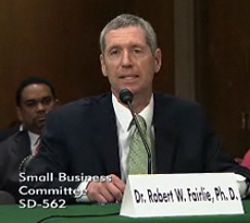Minority-owned businesses are being especially hurt by a lack of access to capital in the current economic downtown, UC Santa Cruz Economics Professor Rob Fairlie told a U.S. Senate committee Thursday.
"They are more vulnerable because they are smaller and have fewer resources to draw upon," Fairlie told members of the Committee on Small Business and Entrepreneurship meeting at the Capitol. The committee is investigating access to capital markets for minority business owners.
Also testifying were representatives of the Small Business Administration and Department of Commerce, and private business development consultants.
Committee chair Senator Mary Landrieu, D-Louisiana, asked Fairlie about his research that shows a significant wealth gap between African-American and white families. Fairlie testified that the median - the midpoint between the high and low -- for black families is $5,500 while the median among white families is more than $87,000.
Fairlie is co-author of Race and Entrepreneurial Success: Black-, Asian-, and White-Owned Businesses in the United States (MIT Press, 2008). He and co-author Alicia M. Robb, produced a report in January on disparities in capital access for minority- and non-minority owned business for the Minority Business Development Agency of the U.S. Department of Commerce.
"Access to financial capital is most important," Fairlie told the Senate committee that includes John Kerry, Olympia Snowe, Joseph Lieberman, and Carl Levin. The lack of access means fewer start-ups from minority business owners and more undercapitalized businesses.
Minority business owners are "constrained by limited wealth, higher loan denial rates, high interest rates, and lending discrimination," Fairlie said.
Minorities are twice as likely to be denied when they apply for a loan and are twice as likely to not even apply because they are discouraged, he said.
At the same time, minority owned small businesses contribute greatly to the U.S. economy, he said. They generate $700 billion in total annual sales and employ 5 million people, with a payroll of $120 million.
Last month, Fairlie briefed a House of Representatives committee on the same subject.
Fairlie's Senate testimony is available at the committee's Website. It begins at about 86 minutes into the hearing.



